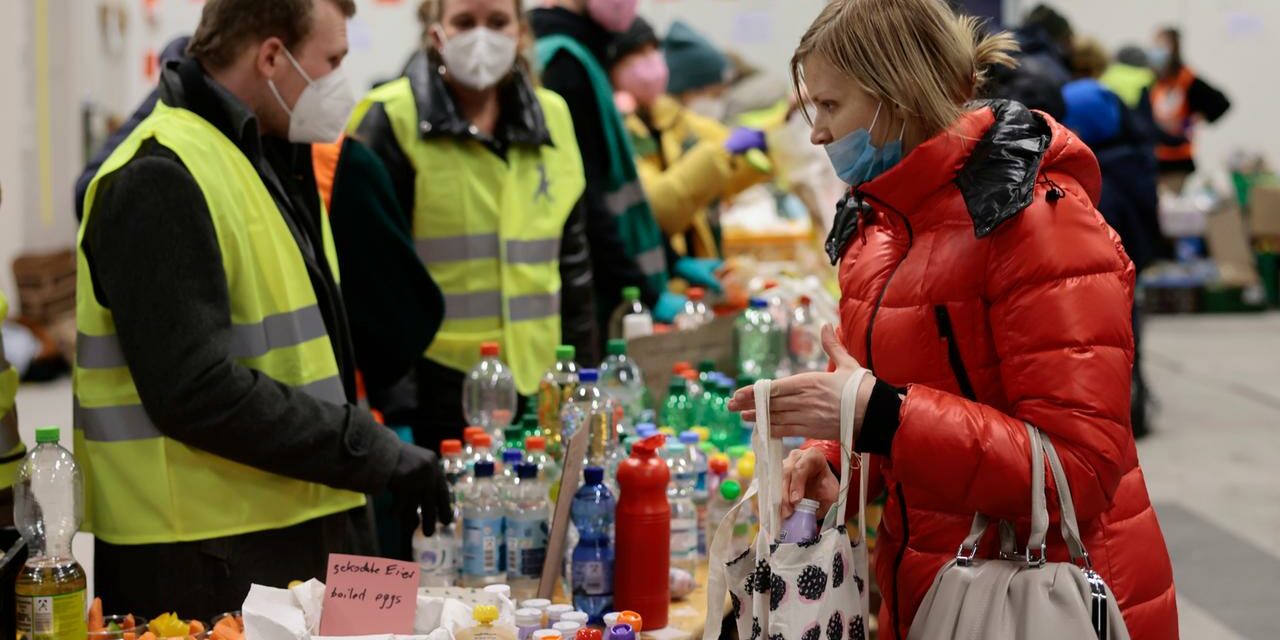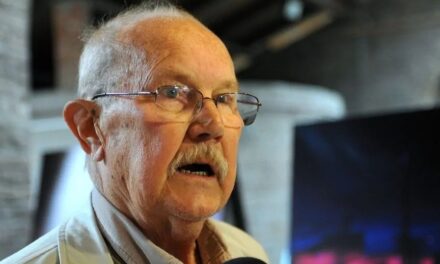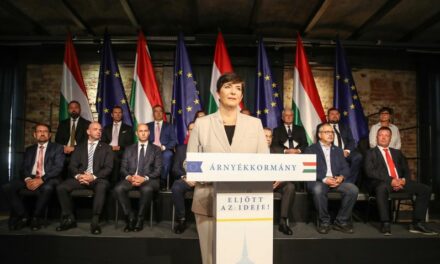So far, the German media has been very careful not to say even a word about the refugees pouring into Hungary. They showed Ukraine's western neighbors in a nice diagram, listing the number of people admitted, but they somehow always skipped a beat at the Hungarian border section. As if it doesn't exist.
For one year, the people of the Internet can watch last Sunday evening's news broadcast by the German public service TV about the Ukrainian refugee crisis. I had a clear sense of deja vu, as if we were in 2015. In Berlin and other big cities, those coming from the war are welcomed with open arms. There are no teddy bears anymore, instead they distribute eco-friendly bags, the bag is decorated with a heart dipped in Ukrainian colors.
Regardless of nationality, the bag goes to anyone, the Russians will only be discriminated against later. Now everyone helps, because people, wherever they live in the world, like to help those in trouble. Politicians also make statements about German solidarity, oddly enough they are all left-wing.
In the spirit of balance, the ZDF sent its staff to the Hungarian-Ukrainian border, let the German see the difference between the two types of treatment! The camera sweeps across the field, we are standing near a sports hall (gym?) that evokes the inevitability of the sixties. Cars parked haphazardly, future-cool people, the appearance of headlessness everywhere. In front of the entrance, a dozen policemen "guard" the refugees, for example, the German TV crew is not allowed to enter the building. Clear as in the southern border section besieged by migrants, although there the transit zone has been built into a reception station equipped with all the necessary comforts. It worked until the European Court of Justice shut it down.
If the white colonial images are not striking enough, i.e. they do not suggest enough of the concept to be said, the staff will help German citizens who unwaveringly believe in public service find their way. Reporter Patricia Schäfer immediately finds her people, the outraged old lady Ludmilla and her daughter, who complain about the registration. At the border, the Hungarians took their passports, they say, and until they get them back, they can't go any further. The disabled husband is not allowed out of the gym, just as families with small children have not been able to leave it for days. The effect is enhanced by a volunteer German-Ukrainian helper who arrived by bus straight from Magdeburg to rescue the refugees from Orbán's clutches. There's war! he shouts, people are fleeing leaving everything behind, and the Hungarians here are asking them for passports! What insensitivity!
The reporter summarizes what he saw, if the situation was not clear based on the coverage. The Hungarians are conducting an apparent refugee policy, showing a refugee-friendly face to the outside world, but they are actually blocking the way for those coming from war zones, which, according to him, does not seem like a friendly step, to say the least.
In fact, we should be happy that on the eleventh day of the war, when one hundred and seventy-eight thousand refugees crossed the Hungarian border, and for whose care the entire country came together, with money, donations, and all kinds of assistance, we got two and a half minutes on the ZDF news. Because somehow the Hungarian-Ukrainian border section has been out of the German media's view until now.
So far, the German media has been very careful not to say even a word about the refugees pouring into Hungary. They showed Ukraine's western neighbors in a nice diagram, listing the number of people admitted, but they somehow always skipped a beat at the Hungarian border section. As if it doesn't exist.
The press was full of the fact that Orbán once again refused to take a joint role, does not allow the transport of weapons through his country, and prevents the Ukrainians from being helped. Moreover, there were also reports that the Putin-friendly Hungarian government, refusing European solidarity, voted against joint sanctions as usual. This was the opposition narrative here as well, I can never decide which came first, does the European press define the topic, or does the Hungarian opposition, which is constructive with them, deliver the misleading news? No matter the official denial, no matter the trial record, nothing matters. Viktor Orbán is the scapegoat for everything, he is the wheelbarrow of the European Union. (Downhill - and that's where the EU has been going for a long time - the wheel binding is especially useful, as it serves to avert danger, restrains the cart, swayed by gravity, rushing to its doom.)
Despite Hungary's consistent, neutral stance on the issue of war and only humanitarian aid, they are slandering us wherever they can.
When the facts can no longer be denied, then comes the second narrative: What could be the reason that Hungarians' anti-refugee attitude suddenly changed? That Viktor Orbán is speaking in an unusually pro-EU way?
They have no idea about the international agreements that Hungary has always adhered to, they don't know that there is a native Hungarian minority in Ukraine, and they don't know that the Hungarians have always accepted people in real trouble into their country.
in their world that does not know history, they do not see the difference between those actually fleeing the neighboring war - women, children, old people - and the male migrants who are flooding Europe for a living . Fortunately, we can see it based on our millennia of historical experience.
This narrative anticipates the layout of the long-enforced European refugee distribution system, the migrant quota. The admission of real refugees is already being turned against the countries that have rejected the quota with a Swedish twist. According to the people of Brussels, no distinction should be made between refugee and refugee, which is what European solidarity demands. No matter where someone comes from or what they are fleeing from, they must be received and distributed among the member states. Let the population mix, let the cultures mix, just in case the big idea gives birth to another war.
However, it would be enough to take an honest look at the conflicts in the ethnically disordered Ukraine or the causes of the war in South Slavs in order to understand how dangerous and thoughtless this intention is.
We need a new refugee policy! says Brussels, and this probably means another version of the knee-jerk reaction. The two frontline countries of the current refugee crisis, Poland and Hungary, are constantly sitting on the European penalty bench. They don't get money for Schengen border protection, they don't get money from the recovery fund, and with reference to the rule of law, cohesion money is expected to be taken away from them as well. A promise has already been made that the EU will take over some of the current burdens. But maybe a vote on the migrant quota will be a condition for relieving the burden?! Would the new refugee policy force consent from countries that have consistently rejected the quota until now?
Featured image: DPA / ZDF













